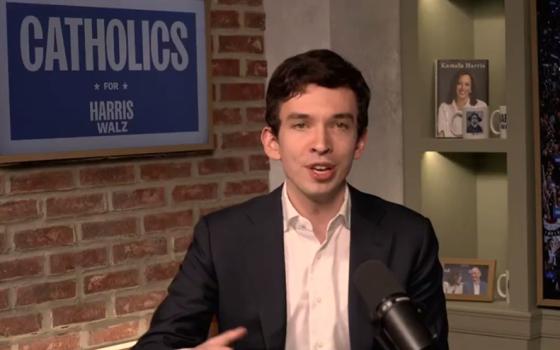By JOHN L. ALLEN JR.
Paris
Pope Benedict XVI is anything but a careless thinker, and even his omissions are usually significant. In that light, as the pope winds up the Paris leg of his first trip to France, one cannot help but wonder about his basic silence on the subject of Islam.
France, after all, has the largest Muslim population in Europe, and it continues to struggle with how to reconcile its commitment to laïcité with the religious sensitivities of this burgeoning Muslim presence. Moreover, Benedict spoke yesterday on the second anniversary of his famous Regensburg address, and his audience at the Collège des Bernardins included a small delegation of Muslims.
Further, it’s not as if inter-faith commentary was simply impossible or inappropriate. Earlier in the day, Benedict gave an address to a group of Jews which included a strong denunciation of anti-Semitism and interesting, albeit brief, theological comments on the importance of the Abrahamic covenant.
Yet Benedict’s lone reference to Islam came in what was almost a throw-away line at the beginning of his speech yesterday evening at the Collège des Bernardins: “I thank the delegates of the French Islamic community for having accepted the invitation to participate in this meeting,” he said. “I convey to them my best wishes for the holy season of Ramadan already underway.”
Efforts to find other allusions to Islam in the pope's words were not altogether convincing. Some, for example, read a reference to “fundamentalist fanaticism” as an indirect allusion to Islamic radicalism, but in context it seemed clear the pope was talking about fundamentalisms of all sorts as a reaction against secularism. Similarly, Benedict referred in his speech at the Elysèe Palace to young people “testing the limits of religious communitarianism,” which is certainly a challenge in many French Muslim communities, but this too was a fleeting and indirect point.
Equally striking is that Benedict never mentioned the subject of immigration while in Paris, which was billed by spokesperson Fr. Federico Lombardi as the segment of this trip specifically addressed to France. (Once Benedict arrives in Lourdes later today, the focus becomes more universal.) Immigration is a subject the pope has addressed several times in other contexts, and it's a theme of obvious importance in France, above all for recent Muslim immigrants.
(To be fair, Benedict did refer at the Elysèe to the need for efforts “to protect the weak and promote their dignity,” bit without connecting that point specifically to immigration.)
Given all that, one could perhaps forgive French Muslims for feeling a bit slighted. Dali Boubaker, rector of the mosque of Paris, said, "We would have liked to hear some emphasis on interreligious dialogue, between Islam and the church, and about shared values."
How to explain the papal reticence on what is, by all accounts, a matter of enormous import both for the Catholic church and for France?
Several possibilities suggest themselves.
First, Benedict XVI is a figure legendarily indifferent to the canons of political correctness and to popular expectations about what he “should” say or do. Perhaps Benedict simply felt that during his day and a half in the French capital he wished to deliver a clear message to French culture about laïcité, and on this occasion didn’t want to muddy the waters with a laundry list of other points.
Second, Benedict may well have felt that he’s said enough in other settings about Christian/Muslim relations, and that he will have another opportunity for a major address on the subject in early November when the first session of the new “Catholic-Muslim Forum,” launched in the wake of his Regensburg address, meets in the Vatican to discuss the themes of “Love of God, Love of Neighbor”, “Theological and Spiritual Foundation”, and “Human Dignity and Mutual Respect”.
Third, Benedict may have concluded that making any reference to Regensburg and the controversies which followed would simply risk opening old wounds. In any event, his speech at the Collège des Bernardins in its own way did treat of the relationship between reason and faith, which was also the meat of his Regensburg lecture. In other words, one could suggest that the speech at the Collège des Bernardins was actually what Regensburg might have been, had it not been for the opening quotation from a 14th century Byzantine emperor to the effect that Muhammad brought things “only evil and inhuman.”
Fourth, it’s generally understood on papal trips that the pontiff will steer clear of direct commentary on local politics, and perhaps the calculation was that wading into such divisive subjects as Islam and immigration would bring the pope dangerously close to breaking this informal taboo. That might have been a special concern given that French President Nicolas Sarkozy is generally seen as something of a hawk on Islamic immigration, so that any extended commentary from the pope might have risked embarrassing his host.
Fifth, it’s clear that Benedict XVI sees religious believers of all stripes in contemporary Europe as natural allies, over against a form of secularism that can be hostile to any public role for religious bodies. In the end, the basic fault line Benedict sees in the world runs not between Islam and the West, but between belief and unbelief – and in that struggle, he believes that a reinvigorated Christianity and a reformed Islam should stand shoulder-to-shoulder. By pressing his case in France for a reconsideration of laïcité, the pope may have felt that he moving the ball on Christian/Muslim relations, even if he didn’t explicitly make the connection.
Sixth, it’s possible that the question of how to reach out to France’s Muslim population came up in the behind-closed-doors session between Benedict and Sarkozy, as opposed to being part of a public speech.
In any event, at least at this stage of Benedict XVI’s trip to France, Islam looms as the great missing element of the pope’s message. Whether his discretion proves to be the better part of valor, or a damaging oversight, is a question with which French commentators and experts on Christian/Muslim relations will doubtless be wrestling in the weeks to come.
---------------------------------------------------------------------
John Allen is filing stories throughout the pope's visit to France and Lourdes. Read all the stories in his daily news column: John L Allen Jr Daily Column. Stories he has already filed include:
Sept 15
• Pope in France: A lesson in 'Marian cool'
Sept 14
• Pope offers prayerful meditation on Eucharist: Jesus 'past, present and future'
• Pope in France: Traditionalists deserve 'a place in the church'
• The Cross, Mary, and hope for 'new vigor' in the Church
Sept 13
• Pope tells shrunken church, 'Don't be afraid'
• Lourdes: Nothing says 'Catholic' like the Virgin Mary
• Explaining Benedict's discretion on Islam
Sept 12
• No reference to Muslims, but pope makes a call to resist 'disaster for humanity'
• Benedict makes a case for 'healthy secularism'
• Pope in France: Averting a secular Iron Curtain
• Pope in France: Latin Mass an 'act of tolerance'
Earlier stories
• Extracts from Sarkozy on church/state relations in France
• Cardinal Tauran on the pope's trip to France
• The Marian Papacy of Benedict XVI
• Benedict hopes to tap the 'creative minority' of French Catholics
(Editor's Note: Some stories are double posted, on NCRonline.org and on NCRcafe.org.)
---------------------------------------------------------------------




